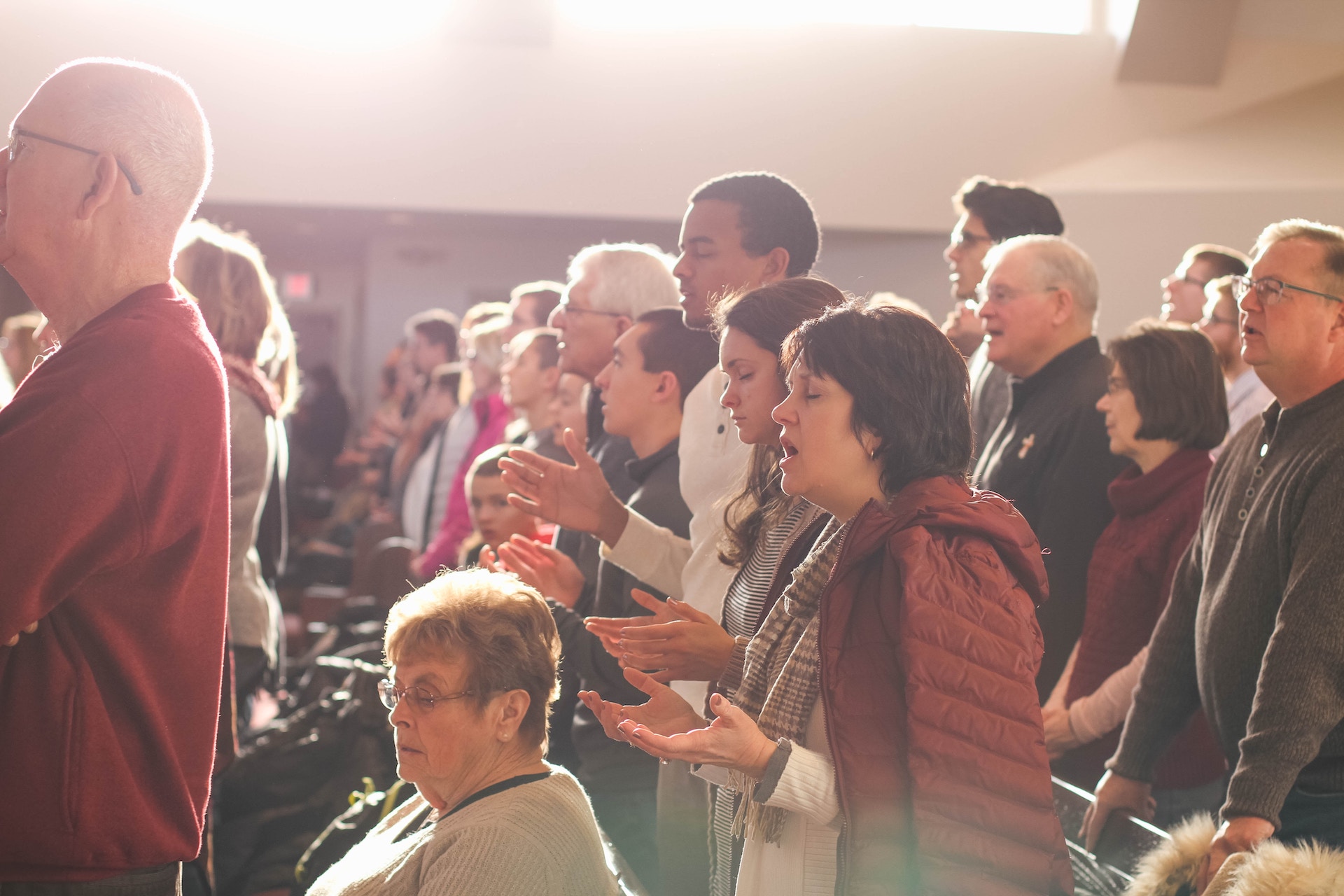
How Do You Measure Success on a Worship Team?

How does a worship team measure success? What does winning look like?
For some worship teams I’ve led, we asked, “Did we avoid a train wreck?” If the answer was yes, that Sunday landed in the “win” column.
Avoiding a mid-song meltdown is a good thing. But once you move past mere musical survival, what does success look like?
Some would say excellence.
Unfortunately, measuring excellence for the worship team is subjective:
- Did I worship well?
- Did I do a good job inviting and encouraging others to worship well?
- Did I have musical and technical…awesomeness?
Measuring our success is tough. But measuring our failure? That’s easy:
- My head was stuck in my music stand the entire set.
- She closed her eyes the whole time and ignored the congregation.
- He botched two transitions.
- You fumbled the words on that verse.
- I came in late on that bridge.
It’s tough to improve when you’re chasing some vague notion of “excellence” with no tangible milestones to gauge progress. And, “Try not to suck,” is not an excellence-inspiring goal.
But think about this: If I’m trying to lose weight, what’s my measure of success?
The numbers on the scale.
The fit of my fat pants.
The number of my chins.
Now, if I’m serious about losing weight, those can’t be the only things I measure. Those are known as “lag measures.” They show up after I’ve done the work. I can’t stand on the scale and will it to read my college-freshman-year weight.
Read more

Worship: Well-Crafted, Authentic and Substantive

Being involved in discussions on what makes for good worship is an interesting experience. What I find in the midst of the back and forth banter is that the dialogue most often is not about the content and craft of worship, but its style. I am not suggesting for a moment that the style of worship is unimportant, but what I find problematic is the notion that what makes for good worship is what people believe will attract others; and they usually define attractive worship according to what they like.
Several years ago, I was out of town at a conference. On Sunday morning I made my way to a historic Congregational Church. The sanctuary was old, but well-kept and attractive. There was no screen for PowerPoint. The church has two traditional services on Sunday morning and two times for worship on Sunday evening it refers to as contemporary/liturgical. Every service was filled to capacity. The congregation was multigenerational and ethnically diverse. College students make up 38 percent of the congregation and 49 percent of the members are in their twenties. The pastor’s sermon was excellent — it was well-crafted, authentic and substantive. Indeed, the entire worship experience could be described in this way. (I forgot to mention that the Sunday I was there, they were taking in approximately 30 to 40 members at each of the four services.)
Read more

How to Encourage People to Sing in Worship

The diagnoses for why people don’t sing in church are many and varied. I tend to break these diagnoses down into three categories: strong opinions that I agree with, strong opinions that I do not agree with and empirically-verifiable scientific studies. Unfortunately, the last category is rare, which is surprising considering how many “labs” (churches) we have available to test! There have been some great studies on the benefits and effects of group singing — many with religious implications — but not many that tell us how to get people to sing.
That doesn’t mean that some of those strong opinions aren’t correct. Congregational music professionals can have some pretty good ideas on how to increase singing participation.
I’ve been a big fan of John Bell’s theories of how to get more people to sing. He writes about them in “The Singing Thing: A Case for Congregational Song.” At a workshop I attended, he said that he had been blessed “with a mediocre voice,” because when congregations heard him lead singing, they automatically thought, “I can do better than that, and I’d better help him out.” John has some practical ways to get people to sing, including teaching the songs to the congregation before worship (what a concept!) and using hand gestures to indicate pitch and rhythm.
One of my favorite scientific studies runs counter to a lot of conventional church wisdom. “The Science of Singing Along: A Quantitative Field Study on Sing-along Behavior in the North of England,” by Alisun Pawley and Daniel Müllensiefen, analyzed the participation of various patrons in English pubs. They found that people are more likely to sing along if
- A song has longer and more complicated musical phrases. This goes against the conventional wisdom that songs should be easy to sing. Apparently, the effort of belting out a long line takes more breath and effort.
- There are more pitches in the chorus hook. Again, a complicated melody with several pitch changes inspired more singing.
- The singer is male. Some folks explain this in terms of primal battle cries, but I think this has more to do with selection bias. Who doesn’t sing along with Aretha Franklin?
- The singer (a higher, male voice) has to expend noticeable effort.
Queen’s “We Are the Champions,” The Village People’s “YMCA,” and Bon Jovi’s “Livin’ On a Prayer” all made the top ten list for most-sung songs in pubs. They are not exactly standard hymn fare for the church. (A summary article with samples of the music can be found here.)
Read more

Ritual and Resistance: 6 Worship Suggestions

“ … ritual isn’t about expressing religious commitment at all, but about doing something in a way that marks the moment as different from the everyday and forces you to see it as important.” That quote came from an article about “Religion without God” that speaks of a growing movement of atheists to gather for “church” services.
As one person put it, “Singing awesome songs, hearing interesting talks, thinking about improving yourself and helping other people — and doing that in a community with wonderful relationships. Which part of that is not to like?”
Read more

Why Worship is a Royal Waste of Time

Read more

Resisting the Urge for Perfection

If you are a part of a congregation, faith community, or serve or volunteer with a nonprofit, you know that it is important to cultivate volunteers or “lay leaders.” You probably also know that when you are building capacity of these volunteers and leaders there will likely be challenges, growth opportunities and growing pains along the way. Perfection won’t always be possible. Perhaps it shouldn’t even be the goal?
A friend of mine recently asked, “In what ways can leaders creatively resist our cultural need for perfection and performance in worship?” This question struck me.
There is something to be said about resisting an urge for perfection and performance. The larger world and culture demand perfection and demand performance now. There is nothing necessarily wrong with this. The challenge when it comes to worship though is that it seemingly creates a group of people who are the “performers” rather than an idea that all people are important parts of the worship experience, worshiping together.
From what I have seen, the cultural focus on perfection and performance has taken a serious toll on congregations and faith communities. Fewer people, perhaps, sing in worship because they don’t feel they have a gift to sing and join the song. This creates more passivity in worship, and even a sense of consumerism. “They will sing to me and I will listen,” rather than, “we will sing and praise God together.”
Read more

Why is Worship Important?

Worship includes proclamation of God’s Word, yet worship is more than Scripture lessons and a sermon. For some people, music is their favorite element of worship; yet even for music lovers, worship is more than a collection of songs. We pray during worship, yet worship is more than prayer. People need to gather for worship to happen, yet worship is much more than just a meeting. Clearly worship is more than the sum of its parts.
“The heart of worship, at least for Jews and Christians, is the celebration of God,” wrote John E. Burkhart in his book “Worship.” “True celebration of God is quite festive, sometimes almost playful, and conspicuous in its gladness as it takes delight in what God is about … Such worship celebrates God, the God known by prophets, psalmists, and apostles, and by multitudes of Jews and Christians, for whom worship is not a duty but a privilege, not a burden but a delight. Worship gladly celebrates the God whose character is caring and sharing, the God who is indecorously gracious.”
Read more

The Practice of Passionate Worship

Why use passionate to describe the practices of fruitful churches?
Without passion, worship becomes dry, routine, boring, and predictable, keeping the form while lacking the spirit. Insufficient planning by leaders, apathy of worshippers, poor quality music, and unkempt facilities contribute to an experience that people approach with a sense of obligation rather than joy. Worship loses its passion. Interpersonal conflict can also threaten the worship life of community, with participants and leaders distracted and exhausted by antagonism. Some services feel inauthentic or self-indulgent as leaders push themselves into the center of attention. Or services can seem as somber as a funeral, when people attend out of obligation, respect, or genuine affection, but privately they wish they were somewhere else. Services sometimes include so many announcements, jokes, digressions, and stories that have nothing to do with the theme, that it feels like a loosely planned, poorly led public meeting. Even with worship in homes, dinner churches, or with online communities, conversation can degenerate into complaining or rumor-mongering. Worship may be the first contact the unchurched have with a faith community, and yet guests may not find genuine warmth or a compelling message. When this happens, people come and go without receiving God.
Worship should express our devotion, our honor and love of God. Passionate describes an intense desire, an ardent spirit, strong feelings, and the sense of heightened importance. Passionate speaks of an emotional connection that goes beyond intellectual consent.
Passionate Worship fosters a yearning to authentically honor God with excellence and with an unusual clarity about connecting people to God. Whether fifteen hundred people attend, or fifteen, Passionate Worship is alive, authentic, fresh, and engaging. People are honest before God and open to God’s presence, truth, and will. People so desire such worship that they reorder their lives to belong. The empty places in their souls are filled. They experience a compelling sense of belonging to the body of Christ.
Read more

Cultivating a Culture of Worship For Every Generation

By: Yancy
Worshipping God is one of our greatest purposes. Although a lot of churches check the box of worship off the list each week, I feel there is still a lot left to be desired in how we are leading others to encounter the presence of Jesus during our times of worship when they gather. I have a burden to help teach this generation so they can understand why we worship God and what that looks like in their life.
I know that many of you who are reading this are involved in adult worship. I want to invite you to think about how your church is raising Christ followers up to be the worshippers that God intends for them to be. As a young child, preteen or student, how are they experiencing God’s presence and growing in their expression of worship?
Read more

Singing as Discipleship Glue: The Surprising Benefit of Going Through the Motions

By Mike O’Brien
Many churches and parachurches create discipleship pathways for members of their organization.Plans typically start with babies and end with senior citizens. There are steps along that pathway to equip that person to become like Christ in a variety of ways. It is rare that you will find singing, reciting creeds, sacrament, or other activities related to gathered worship as a part of these discipleship systems. Worship or music are rarely thought of as a means to an end in discipleship.
A church service rooted in a Christocentric, Trinitarian and unified retelling of God’s grand story can do much of the “work” of discipleship. Since singing takes up a majority of what we literally all do together, I believe the lyric of our songs is the most crucial component of what we are saying about who our God is and what he does.
You might have seen the popular sign “now entering the mission field” as you exit a church parking lot. I have never truly grasped that notion because I was literally saved and discipled on a church campus in my early teens. The music minister of my PCA (Presbyterian Church of America) church plant made space for me to play the saxophone with the hymns, then taught me the bass guitar, then gave me a job for $25/wk stacking the chairs. I was literally mentored and saved on Sunday.
Read more


